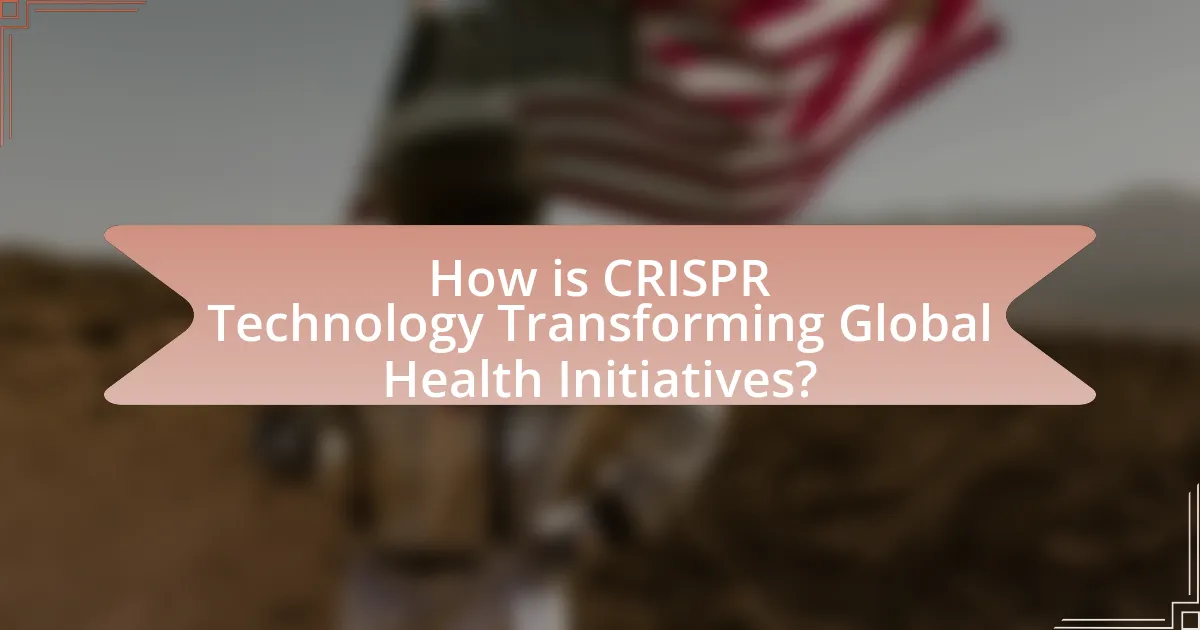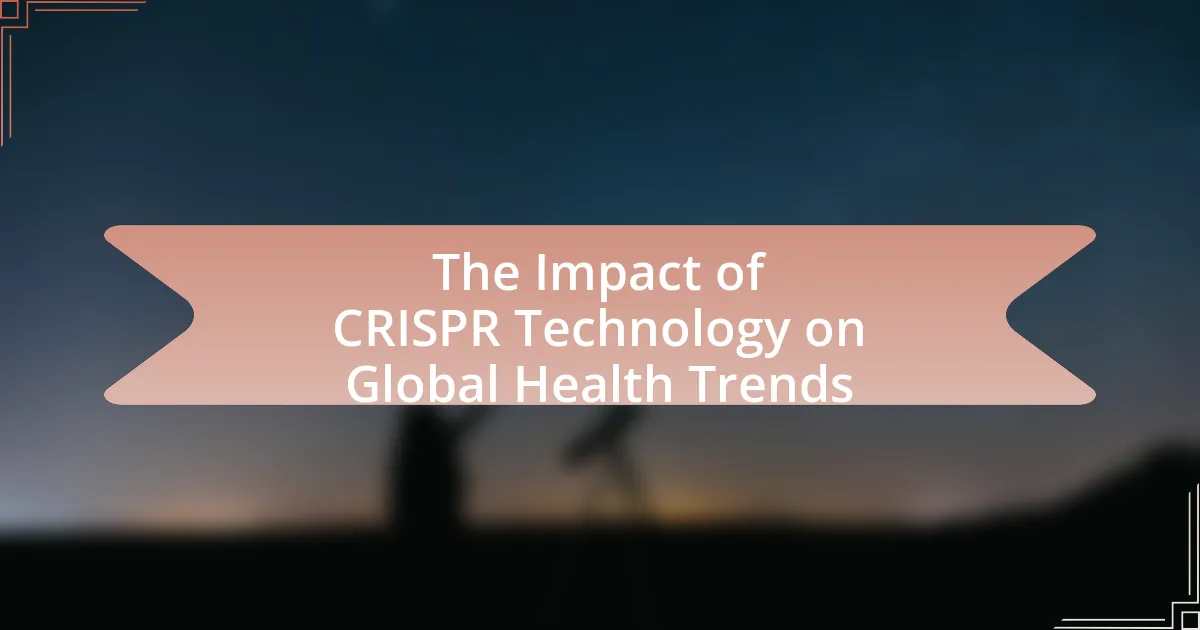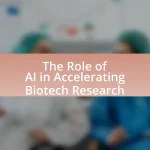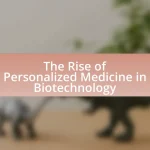CRISPR technology is a revolutionary gene-editing tool that significantly impacts global health trends by enabling precise modifications of genetic material, leading to advancements in disease treatment and prevention. This article explores the influence of CRISPR on disease prevention, targeting specific genetic disorders such as sickle cell anemia and cystic fibrosis, and its role in enhancing vaccine development. Additionally, it addresses ethical considerations surrounding CRISPR applications, the regulatory frameworks governing its use, and the technology’s potential to improve healthcare access in low-resource settings. The article also highlights future trends and innovations in CRISPR technology that could reshape global health initiatives and address emerging health threats.

What is the Impact of CRISPR Technology on Global Health Trends?
CRISPR technology significantly impacts global health trends by enabling precise gene editing, which facilitates advancements in disease treatment and prevention. This technology allows for the targeted modification of genetic material, leading to potential cures for genetic disorders such as sickle cell anemia and cystic fibrosis, as demonstrated in clinical trials where patients showed remarkable improvements post-treatment. Furthermore, CRISPR’s application in agriculture enhances food security by developing crops resistant to pests and diseases, thereby addressing malnutrition and food scarcity issues. The World Health Organization has recognized the potential of CRISPR in combating infectious diseases, including HIV and malaria, by enabling the development of innovative therapies and vaccines. Overall, CRISPR technology is reshaping health outcomes globally by providing tools for more effective medical interventions and sustainable agricultural practices.
How does CRISPR technology influence disease prevention and treatment?
CRISPR technology significantly influences disease prevention and treatment by enabling precise genetic modifications that can eliminate or correct genetic disorders. This gene-editing tool allows researchers to target specific DNA sequences, making it possible to disrupt genes responsible for diseases such as sickle cell anemia and cystic fibrosis. For instance, a study published in the journal Nature demonstrated that CRISPR could successfully edit the genes of human embryos to prevent inherited diseases, showcasing its potential in therapeutic applications. Additionally, CRISPR has been utilized in developing vaccines, such as those for COVID-19, by allowing rapid modifications to viral genomes, thus enhancing the speed and efficacy of vaccine development.
What specific diseases are being targeted by CRISPR interventions?
CRISPR interventions are specifically targeting genetic diseases such as sickle cell anemia, cystic fibrosis, and muscular dystrophy. Research has demonstrated the efficacy of CRISPR in correcting mutations responsible for these conditions. For instance, a study published in the journal Nature in 2020 by Frangoul et al. showed successful treatment of sickle cell disease in patients using CRISPR technology, highlighting its potential to alter the course of genetic disorders. Additionally, ongoing clinical trials are exploring CRISPR’s application in treating various cancers and HIV, further expanding its therapeutic reach.
How does CRISPR technology enhance vaccine development?
CRISPR technology enhances vaccine development by enabling precise genetic modifications that accelerate the design and testing of vaccine candidates. This technology allows researchers to quickly edit the genomes of pathogens, facilitating the identification of effective antigens and the development of targeted vaccines. For instance, during the COVID-19 pandemic, CRISPR was utilized to rapidly develop mRNA vaccines by optimizing the genetic sequences for better immune responses. Studies have shown that CRISPR can reduce the time needed for vaccine development from years to months, significantly improving response times to emerging infectious diseases.
What are the ethical considerations surrounding CRISPR technology in healthcare?
The ethical considerations surrounding CRISPR technology in healthcare include concerns about genetic modification, equity in access, potential for unintended consequences, and the implications of germline editing. Genetic modification raises questions about the morality of altering human DNA, particularly in embryos, which could lead to unforeseen health issues or societal inequalities. Equity in access highlights the risk that only affluent populations may benefit from CRISPR advancements, exacerbating existing health disparities. Potential unintended consequences involve off-target effects that could cause harmful mutations, raising safety concerns. Germline editing, which affects future generations, poses ethical dilemmas regarding consent and the long-term impact on human evolution. These considerations are critical as CRISPR technology continues to advance and integrate into healthcare practices.
How do ethical concerns affect public perception of CRISPR applications?
Ethical concerns significantly influence public perception of CRISPR applications by fostering skepticism and fear regarding potential misuse. For instance, issues such as gene editing in humans, designer babies, and ecological impacts raise moral questions that lead to public apprehension. A survey conducted by the Pew Research Center in 2018 revealed that 72% of Americans expressed concern about the ethical implications of gene editing technologies, indicating a strong link between ethical considerations and public sentiment. This skepticism can hinder acceptance and support for CRISPR innovations, ultimately affecting funding, research, and regulatory policies in the field of genetic engineering.
What regulations are in place to govern CRISPR research and application?
Regulations governing CRISPR research and application include guidelines from various national and international bodies. In the United States, the National Institutes of Health (NIH) oversees gene editing research through the Recombinant DNA Advisory Committee (RAC), which evaluates proposals involving human subjects. The Food and Drug Administration (FDA) also regulates gene therapies, ensuring safety and efficacy before clinical use. Internationally, the World Health Organization (WHO) has established a framework for the governance of human genome editing, emphasizing ethical considerations and public engagement. These regulations are designed to ensure responsible use of CRISPR technology while addressing potential ethical and safety concerns.

How is CRISPR Technology Transforming Global Health Initiatives?
CRISPR technology is transforming global health initiatives by enabling precise gene editing to combat genetic disorders, infectious diseases, and agricultural challenges. This technology allows researchers to modify DNA sequences with high accuracy, which has led to significant advancements in gene therapies for conditions like sickle cell anemia and muscular dystrophy. For instance, clinical trials have demonstrated that CRISPR-based therapies can effectively reduce symptoms and improve patient outcomes, as seen in the case of sickle cell disease where patients have shown remarkable recovery after treatment. Additionally, CRISPR is being utilized to develop rapid diagnostic tools and vaccines, such as those for COVID-19, showcasing its potential to address public health emergencies efficiently. The World Health Organization has recognized the importance of CRISPR in enhancing global health strategies, emphasizing its role in improving disease prevention and treatment methods.
What role does CRISPR play in addressing global health disparities?
CRISPR plays a significant role in addressing global health disparities by enabling precise genetic modifications that can lead to the development of affordable treatments for diseases prevalent in low-resource settings. This technology allows researchers to target and edit genes associated with conditions such as malaria and sickle cell disease, which disproportionately affect populations in developing countries. For instance, a study published in Nature in 2020 demonstrated that CRISPR could effectively modify the genes of mosquitoes to reduce malaria transmission, potentially lowering the disease burden in affected regions. By making gene editing more accessible and cost-effective, CRISPR has the potential to bridge the gap in healthcare access and improve health outcomes for marginalized communities worldwide.
How can CRISPR technology improve access to healthcare in low-resource settings?
CRISPR technology can improve access to healthcare in low-resource settings by enabling cost-effective and rapid development of diagnostics and treatments for various diseases. This gene-editing tool allows for the precise modification of genetic material, which can lead to the creation of affordable diagnostic tests that can be deployed in remote areas, thus facilitating early detection of diseases such as malaria and tuberculosis. For instance, a study published in Nature Biotechnology demonstrated that CRISPR-based diagnostics could detect viral infections with high sensitivity and specificity, making them suitable for use in low-resource environments. Additionally, CRISPR can streamline the production of vaccines and therapeutics, reducing costs and increasing availability, which is crucial for underserved populations.
What partnerships are forming to leverage CRISPR for global health solutions?
Partnerships are forming between academic institutions, biotechnology companies, and non-profit organizations to leverage CRISPR for global health solutions. For instance, the collaboration between the Broad Institute and various pharmaceutical companies aims to develop CRISPR-based therapies for genetic disorders. Additionally, the Gates Foundation has partnered with researchers to utilize CRISPR technology in combating infectious diseases, such as malaria and tuberculosis. These partnerships are crucial as they combine resources, expertise, and funding to accelerate the development of CRISPR applications that address pressing global health challenges.
How does CRISPR technology contribute to personalized medicine?
CRISPR technology contributes to personalized medicine by enabling precise genetic modifications that tailor treatments to individual patients’ genetic profiles. This capability allows for the identification and correction of genetic mutations responsible for diseases, leading to more effective and targeted therapies. For instance, studies have demonstrated that CRISPR can be used to edit genes associated with conditions like sickle cell disease and certain cancers, resulting in significant improvements in patient outcomes. The ability to customize medical interventions based on a patient’s unique genetic makeup enhances the efficacy of treatments and minimizes adverse effects, thereby revolutionizing the approach to healthcare.
What advancements in genomics are facilitated by CRISPR technology?
CRISPR technology facilitates significant advancements in genomics, including precise gene editing, the development of gene therapies, and the ability to create genetically modified organisms. This technology allows researchers to target specific DNA sequences for modification, enabling the correction of genetic disorders such as sickle cell anemia and cystic fibrosis. For instance, a study published in the journal Nature in 2019 demonstrated the successful use of CRISPR to edit genes in human embryos, showcasing its potential for treating genetic diseases. Additionally, CRISPR has accelerated the pace of genomic research by enabling high-throughput screening of gene functions, which enhances our understanding of complex diseases and biological processes.
How does personalized medicine impact treatment outcomes for patients?
Personalized medicine significantly improves treatment outcomes for patients by tailoring therapies based on individual genetic, environmental, and lifestyle factors. This approach allows healthcare providers to select the most effective treatments for specific patient profiles, leading to higher efficacy and reduced adverse effects. For instance, studies have shown that patients with certain genetic markers respond better to targeted therapies, such as those used in oncology, resulting in improved survival rates and quality of life. The integration of genomic data into clinical practice has been associated with a 30% increase in treatment success rates in some cancer therapies, demonstrating the tangible benefits of personalized medicine in enhancing patient care.

What are the Future Trends of CRISPR Technology in Global Health?
Future trends of CRISPR technology in global health include advancements in gene therapy, precision medicine, and agricultural biotechnology. These trends are driven by the increasing ability to edit genes with high specificity and efficiency, which has the potential to treat genetic disorders, enhance disease resistance in crops, and improve overall public health outcomes. For instance, CRISPR-based therapies are being developed for conditions like sickle cell anemia and muscular dystrophy, with clinical trials showing promising results. Additionally, the integration of CRISPR with other technologies, such as artificial intelligence, is expected to accelerate the discovery of new treatments and enhance diagnostic capabilities. The global market for CRISPR technology is projected to grow significantly, reflecting its expanding applications in health and agriculture, with estimates suggesting a market size of over $10 billion by 2025.
What innovations are on the horizon for CRISPR applications in healthcare?
Innovations on the horizon for CRISPR applications in healthcare include advancements in gene editing techniques, such as CRISPR-Cas9 and CRISPR-Cas12, which are being refined for increased precision and reduced off-target effects. These innovations aim to enhance the treatment of genetic disorders, cancers, and infectious diseases by enabling more accurate modifications to the genome. For instance, recent studies have demonstrated the potential of CRISPR to correct mutations responsible for conditions like sickle cell disease and beta-thalassemia, with clinical trials showing promising results in patient outcomes. Additionally, the development of CRISPR-based diagnostic tools, such as SHERLOCK and DETECTR, is set to revolutionize rapid disease detection, including viral infections like COVID-19, by providing quick and accurate results.
How might CRISPR technology evolve to tackle emerging health threats?
CRISPR technology may evolve to tackle emerging health threats by enhancing its precision and expanding its applications in gene editing. Advances in CRISPR systems, such as CRISPR-Cas9 and CRISPR-Cas12, are expected to improve targeting accuracy, reducing off-target effects and increasing the safety of genetic modifications. For instance, researchers are developing base editing techniques that allow for precise nucleotide changes without double-strand breaks, which could be crucial for addressing genetic disorders linked to emerging pathogens. Furthermore, CRISPR’s adaptability can be harnessed for rapid responses to infectious diseases, as demonstrated by its use in developing diagnostics for COVID-19, showcasing its potential for real-time health threat management. The ongoing research and clinical trials indicate a promising trajectory for CRISPR in combating future health challenges effectively.
What potential breakthroughs could reshape the landscape of global health?
CRISPR technology has the potential to reshape the landscape of global health through advancements in gene editing, which can lead to the treatment and prevention of genetic disorders, infectious diseases, and cancer. For instance, CRISPR has been successfully used in clinical trials to treat sickle cell disease and beta-thalassemia, demonstrating its capability to correct genetic mutations. Additionally, CRISPR’s application in developing vaccines, such as the rapid creation of a vaccine for COVID-19, showcases its ability to respond swiftly to emerging health threats. These breakthroughs not only enhance treatment options but also improve public health outcomes by enabling targeted therapies and reducing the burden of diseases globally.
What best practices should be followed when implementing CRISPR technology in health initiatives?
Best practices for implementing CRISPR technology in health initiatives include ensuring ethical considerations, conducting thorough risk assessments, and engaging with stakeholders. Ethical considerations involve obtaining informed consent and addressing potential societal impacts, as highlighted by the National Academy of Sciences, which emphasizes the importance of public dialogue in gene editing. Thorough risk assessments should evaluate off-target effects and long-term consequences, supported by studies indicating that precise targeting is crucial for safety. Engaging with stakeholders, including patients, healthcare providers, and policymakers, fosters transparency and trust, as demonstrated by successful initiatives that incorporate community feedback in their design and implementation.
How can stakeholders ensure ethical compliance in CRISPR research?
Stakeholders can ensure ethical compliance in CRISPR research by establishing and adhering to comprehensive ethical guidelines and regulatory frameworks. These frameworks should include rigorous oversight mechanisms, such as Institutional Review Boards (IRBs) and ethics committees, which evaluate research proposals for ethical considerations. Additionally, stakeholders must engage in transparent communication with the public and the scientific community to foster trust and accountability. Evidence from the National Academy of Sciences emphasizes the importance of public engagement and ethical review processes in maintaining responsible research practices. By implementing these measures, stakeholders can effectively navigate the ethical complexities associated with CRISPR technology.
What strategies can enhance collaboration among researchers and healthcare providers?
Enhancing collaboration among researchers and healthcare providers can be achieved through the establishment of interdisciplinary teams, regular communication channels, and shared goals. Interdisciplinary teams bring together diverse expertise, fostering innovation and comprehensive approaches to healthcare challenges. Regular communication channels, such as joint meetings and collaborative platforms, facilitate the exchange of ideas and updates, ensuring alignment on research and clinical practices. Shared goals, particularly in the context of CRISPR technology, can drive collective efforts towards addressing global health issues, as evidenced by initiatives like the Human Genome Project, which successfully united researchers and clinicians to advance genetic research and its applications in healthcare.


